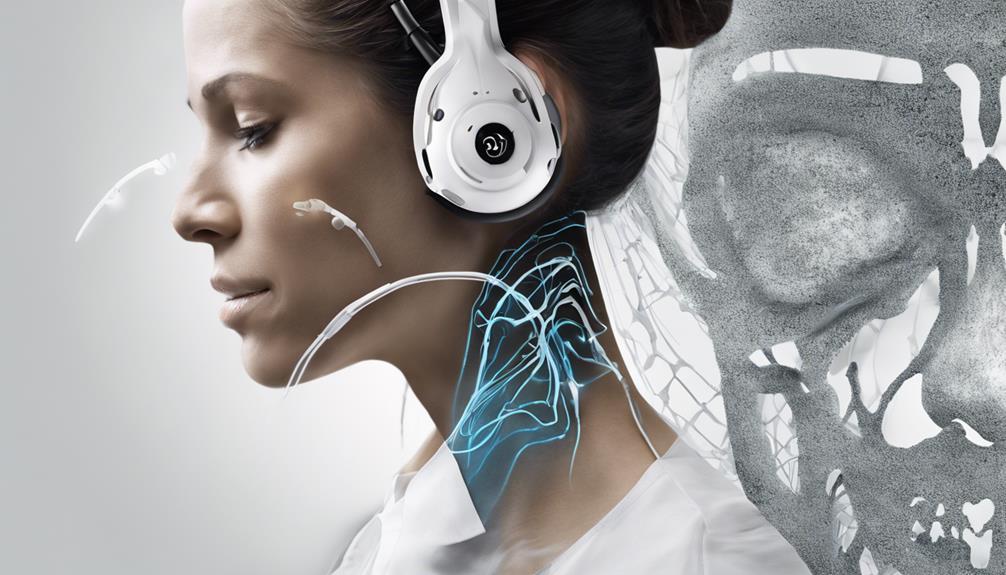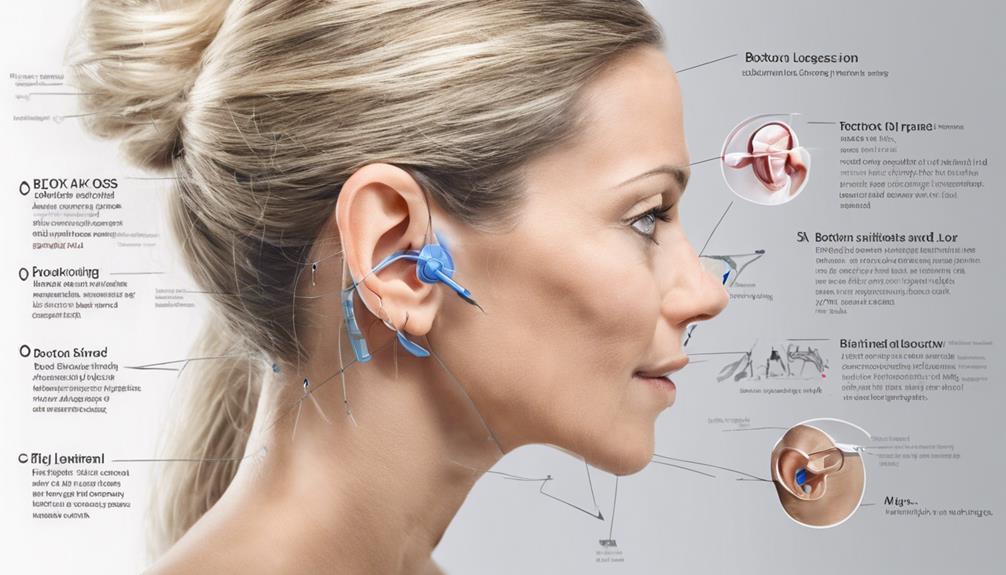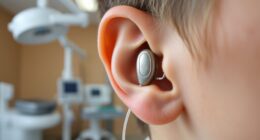It is crucial to comprehend the intricate connection between the varicella-zoster virus and conditions like Ramsay Hunt syndrome in order to prevent herpes-related hearing loss.
The implications of this link go beyond mere discomfort, hinting at a more profound impact on one's overall health.
By understanding the causes and solutions in this context, we can potentially unveil crucial insights that may revolutionize our approach to combating this issue.
Key Takeaways
- Vaccination against varicella-zoster virus is crucial for prevention.
- Early diagnosis and treatment are essential to prevent herpes-related hearing loss.
- Maintaining a healthy immune system can help reduce the risk.
- Avoiding contact with individuals with shingles can lower the chances of infection.
Understanding Herpes-Related Hearing Loss
Understanding Herpes-Related Hearing Loss involves recognizing the impact of conditions like Ramsay Hunt syndrome or herpes zoster oticus caused by the varicella-zoster virus reactivating in the facial or auditory nerves. Ramsay Hunt syndrome, a type of herpes zoster oticus, presents with symptoms such as facial nerve paralysis, ear pain, tinnitus, and dizziness. Prompt diagnosis is crucial as antiviral therapy can mitigate symptoms and prevent permanent damage to hearing.
The varicella-zoster virus, responsible for chickenpox and shingles, lies dormant in nerve cells after the initial infection and can reactivate, affecting the nerves related to hearing and balance. Diagnosis of herpes-related hearing loss involves a thorough medical history, physical examination, and possibly imaging tests like MRI or CT scans.
Prevention strategies include early antiviral treatment for active infections, vaccination against the varicella-zoster virus, and avoiding close contact with individuals displaying symptoms of herpes infections. Understanding these aspects of herpes-related hearing loss is vital for effective management and prevention.
Identifying Risk Factors

Identifying risk factors associated with herpes-related hearing loss is crucial for early intervention and prevention strategies. Several key factors can increase the likelihood of developing complications such as hearing loss from conditions like herpes zoster oticus or Ramsay Hunt syndrome:
- Advanced age: Individuals over 60 are more susceptible to severe outcomes, including permanent hearing damage.
- History of chickenpox or shingles: Those who've had these viral infections are at a higher risk of developing herpes-related hearing loss.
- Immunocompromised status: Individuals with conditions like HIV or undergoing chemotherapy have a greater likelihood of experiencing severe complications, such as facial paralysis and profound hearing loss.
- Underlying medical conditions: Poor immune function or other medical issues can contribute to an increased risk of developing herpes-related hearing loss.
Early detection plays a critical role in mitigating the risk of permanent damage to hearing associated with herpes infections. Understanding these risk factors is essential for timely intervention and effective prevention strategies.
Exploring Preventative Measures

To effectively combat herpes-related hearing loss, implementing preventative measures is essential in minimizing the risk of complications. Vaccination against the varicella-zoster virus, the culprit behind herpes zoster oticus, can significantly reduce the chances of reactivation and subsequent hearing loss. Early initiation of antiviral treatment within 72 hours of symptom onset is crucial for lowering the risk of herpes-related hearing impairments.
Regular consultations with healthcare providers to monitor and promptly address any signs of herpes zoster oticus play a pivotal role in preventing complications like hearing loss. Maintaining a robust immune system through proper nutrition, exercise, and stress management is also key in potentially decreasing the likelihood of developing herpes-related hearing loss.
Additionally, avoiding contact with individuals experiencing active shingles can help decrease the risk of contracting the varicella-zoster virus and subsequently developing herpes-related hearing loss. By adhering to these preventative measures, individuals can take proactive steps to safeguard their hearing health against the detrimental effects of herpes-related complications.
Treatment Options Available

To address herpes-related hearing loss, treatment options encompass antiviral medications like acyclovir, valacyclovir, and famciclovir, often combined with corticosteroids to target the viral infection and reduce inflammation. Pain relievers may also be recommended to manage discomfort associated with this condition. Specific treatment regimens for herpes-related hearing loss vary based on factors such as symptom severity, underlying health conditions, and individual responses to initial therapies. Early intervention is crucial in managing herpes-related hearing loss to prevent complications such as facial paralysis, Ramsay Hunt syndrome, or herpes zoster oticus. Timely treatment not only aids in symptom alleviation but also increases the likelihood of a successful recovery.
- Antiviral medications like acyclovir, valacyclovir, and famciclovir
- Corticosteroids for reducing inflammation and improving nerve function
- Pain relievers to manage discomfort
- Individualized treatment regimens based on symptom severity and response to therapy
Promoting Hearing Health
Regular hearing screenings play a crucial role in maintaining optimal hearing health and preventing irreversible damage, emphasizing the importance of early detection in managing herpes-related hearing loss. These screenings can help identify any signs of hearing loss early on, enabling prompt intervention to mitigate the impact of herpes-related complications on hearing. Additionally, maintaining overall ear health is essential in reducing the risk of hearing loss. This includes avoiding exposure to loud noises, using ear protection in noisy environments, and practicing good ear hygiene to prevent infections that may exacerbate herpes-related issues in the ear.
Furthermore, managing stress levels and adopting a healthy lifestyle can support immune function, potentially reducing the severity of herpes outbreaks affecting the ears. Staying up to date with vaccinations, such as the shingles vaccine, is also crucial in lowering the chances of developing herpes zoster oticus and subsequent hearing loss. Seeking prompt medical attention and adhering to recommended treatment protocols for herpes infections near the ear are vital steps in preventing complications like permanent hearing impairment.
Frequently Asked Questions
Can Herpes Cause Permanent Hearing Loss?
Yes, herpes can cause permanent hearing loss. The varicella-zoster virus, responsible for herpes zoster oticus, can damage the auditory nerve or other ear structures, leading to long-term hearing impairment.
Prompt treatment is essential to reduce the risk of permanent hearing loss. Severe cases of herpes zoster oticus may increase the likelihood of lasting hearing deficits.
Regular monitoring by healthcare professionals can help detect and manage any hearing issues resulting from this condition.
How Do You Treat Hearing Loss From a Viral Infection?
When treating hearing loss from a viral infection, early intervention with antiviral drugs like acyclovir is key. These medications, often paired with corticosteroids, work to combat inflammation and improve nerve function.
Seeking prompt evaluation and treatment from specialists like otolaryngologists or audiologists is crucial for optimizing outcomes. Additionally, supportive measures such as hearing aids or cochlear implants may be considered for persistent viral-induced hearing loss.
How Do You Treat Herpes Oticus?
When treating herpes oticus, a combination of antiviral medications and corticosteroids is commonly used to target the varicella-zoster virus, reduce inflammation, and improve nerve function. Early administration of these medications is crucial to enhance treatment effectiveness and minimize long-term complications.
Tailored approaches may be necessary for specific populations like HIV patients or pregnant women to ensure optimal outcomes. This combined therapy approach has demonstrated significant benefits in managing symptoms and reducing the severity of herpes oticus.
How Do You Treat Nerve Damage in the Ear?
When treating nerve damage in the ear, medications like corticosteroids can reduce inflammation and aid in healing. Surgical options such as decompression surgery or nerve grafting may be necessary for severe cases.
Physical therapy and specific exercises can enhance nerve function, restoring balance and coordination. Assistive devices like hearing aids or cochlear implants may be recommended to improve auditory nerve-related hearing loss.
Early diagnosis and swift treatment are vital in preventing long-term complications.
Conclusion
In conclusion, early intervention is crucial in preventing herpes-related hearing loss.
Did you know that up to 60% of individuals with Ramsay Hunt syndrome may experience permanent hearing loss if not treated promptly?
By understanding the risk factors, seeking medical help early, and considering vaccination options, we can protect our hearing health and prevent the devastating consequences of herpes-related complications.
Stay informed and take proactive steps to safeguard your hearing.










